Anmoal Gill, a program coordinator at the Brampton-based Punjabi Community Health Services (PCHS), had six or seven phone calls on Saturday April 24 with a young man. He had some reservations about getting himself and his parents vaccinated at a pop-up vaccine clinic that PCHS would help operate on May 3 and 4 inside a hockey rink. Finally, the twentysomething put his parents on the phone. They peppered Gill with questions about the COVID-19 vaccines, but she was so attentive and approachable that at one point they even asked her if she was their son’s friend. She ended up booking appointments for the entire family.
The sort of patient, painstaking conversation that Gill had is part of a broader outreach strategy that community-health organizations like PCHS are using as they partner with larger institutions, such as hospitals and regional public health units, to roll out vaccines in COVID-19 hot spots in the GTA. This outreach model tries to make getting vaccinated as accessible and equitable as possible by bringing vaccination registration directly to hot-spot residents through canvassing, flyer distribution, and targeted social media and email blasts. Overall, the goal is in part to reach those groups, including essential workers and immigrants in crowded or multi-generational households, that are both especially susceptible to contracting COVID-19 and that have trouble booking vaccinations through the first-come-first-served provincial system.
This proactive outreach is key to “reaching people who are really hard to get at through traditional mechanisms,” said Sophia Ikura, founder and executive director of the Health Commons Solutions Lab, which has trained hundreds of community-outreach workers hired by community-based organizations in conducting this type of outreach.
The provincial system for booking vaccine appointments, which has been confusing and dysfunctional for many, can require resources and skills that those who are most vulnerable to contracting COVID-19 don’t always have. Some migrants and refugees who do not speak English well have had trouble navigating government webpages and automated voice-messaging systems. Front-line and essential workers generally cannot access computers and use phones for prolonged periods during their workdays, leaving them with fewer opportunities to book appointments and less flexibility to get vaccinated. Nor can they continuously scroll through social media looking for announcements about newly available appointments. “With Vaccine Hunters, it’s usually people who are working from home that see those updates,” said Raveen Bahniwal, a community ambassador with PCHS. “We’re trying to target the people who don’t have social media.”
This sort of outreach is particularly important in Brampton because, as in many hot spots in the GTA, vaccines have been relatively scarce. There have been comparatively few pharmacies offering vaccines to residents and few pop-up clinics. In the view of Dr. Amanpreet Brar, who was once precariously employed in a warehouse, these pop-up clinics weren’t “taken up fast enough” because of “chronic underfunding of the health care” in Brampton, where only one hospital serves a population of about 650,000. Now, pop-up clinics will hopefully “fill a gap” in the GTA’s vaccine rollout, said Paul Das, a physician who played a key role in the effort to set up pop-up clinics in Rexdale, a hot spot in northwestern Toronto. The large institutions supplying vaccines to pop-up clinics, such as hospitals and public health units, have turned to community-based organizations on key operational decisions, drawing on their connections and detailed local knowledge to tailor the outreach and operations of the clinics to the needs of hot-spot residents.
“This moment of recognition for the critical expertise that community leaders have is uncommon,” said Ikura. “It is a rebalancing of power … Community leadership has been saying for many years that services need to come to people and they need to be designed for access.”
She had never seen a hospital defer to a community partner about decisions as fundamental as where to set up a clinic, and “I’ve worked in health care for 20 years.”
Calibrating the pop-up clinic to the needs of the local community certainly appears to have motivated PCHS as it prepared to co-manage the clinic on May 3 and 4, after representatives from the Region of Peel reached out to Gill and another program coordinator on April 25 or 26 and gave them a week to organize most aspects of its operations. Such considerations informed PCHS’s choice of venue, the hockey rink inside a community centre. “People come here to bring their kids for sports; people come here for seniors’ programs; they come here for the library,” said Gill. “It’s a well-known community location that’s very easily accessible by bus.”
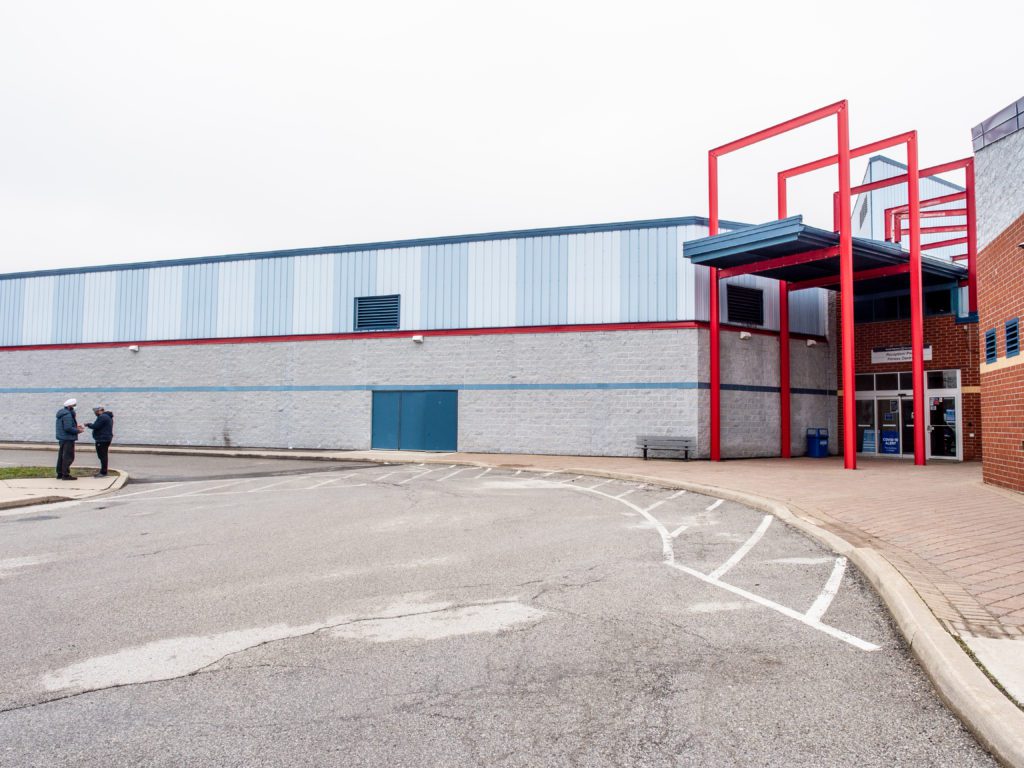
Community centre and pop-up vaccine clinic on May 4, 2021. Despite the very busy clinic, there were none of the large line-ups that have affected other pop-up clinics.
After confirming the location on Wednesday morning, PCHS and a partner organization, Indus Community Services, marshalled eight community-outreach workers, known as community ambassadors, who spent the next three days knocking on the doors of residences and entering local businesses, spreading the word about the upcoming clinic. They registered those who expressed interest through a process designed to be as seamless and analog as possible: they wrote down people’s names, dates of birth, and phone numbers. Later, someone from PCHS would follow up over the phone and book the interested resident. Five hundred people were registered for vaccines through this on-the-ground canvassing, while 500 more were registered via a booking code distributed through carefully chosen channels. “It was a very targeted approach,” Gill said. “We wanted to make sure that the people who need the vaccine are able to get it.”
Tyson Manak, a community ambassador with Indus Community Services, said that canvassing was “really, really hectic,” and that at times when trudging through the rain, he was stressed and exhausted. But it was well worth it, he said: without the outreach effort, “these people just don’t have access to these good resources and facilities to get the vaccination.”
Harjoban Arraich, a PCHS community ambassador, also noted that the outreach allowed PCHS and Indus to reach people who faced a number of challenges in accessing the vaccines. He recalled helping someone in a wheelchair arrive at their appointment by arranging a taxi and translating for those who did not speak English. “Anything that is a barrier, we try to find a way to come together and fix the problem,” he said.
Many people who waited under medical supervision in a seating area in the rink-turned-clinic after receiving their vaccines on May 4 confirmed that they had had trouble accessing vaccines before being contacted by PCHS. One young woman, Harleen Grewal, had tried booking vaccine appointments for herself and her mother, who works in a factory: “I was going to book through Rexall, but whenever I tried to hop on the site, it would just crash,” she said. Bina Dewan, who works at Tim Horton’s, also could not book an appointment with Rexall. A woman named V. Shah said that speaking to a community ambassador at PCHS over the phone was much easier than navigating a website that “was not working.”
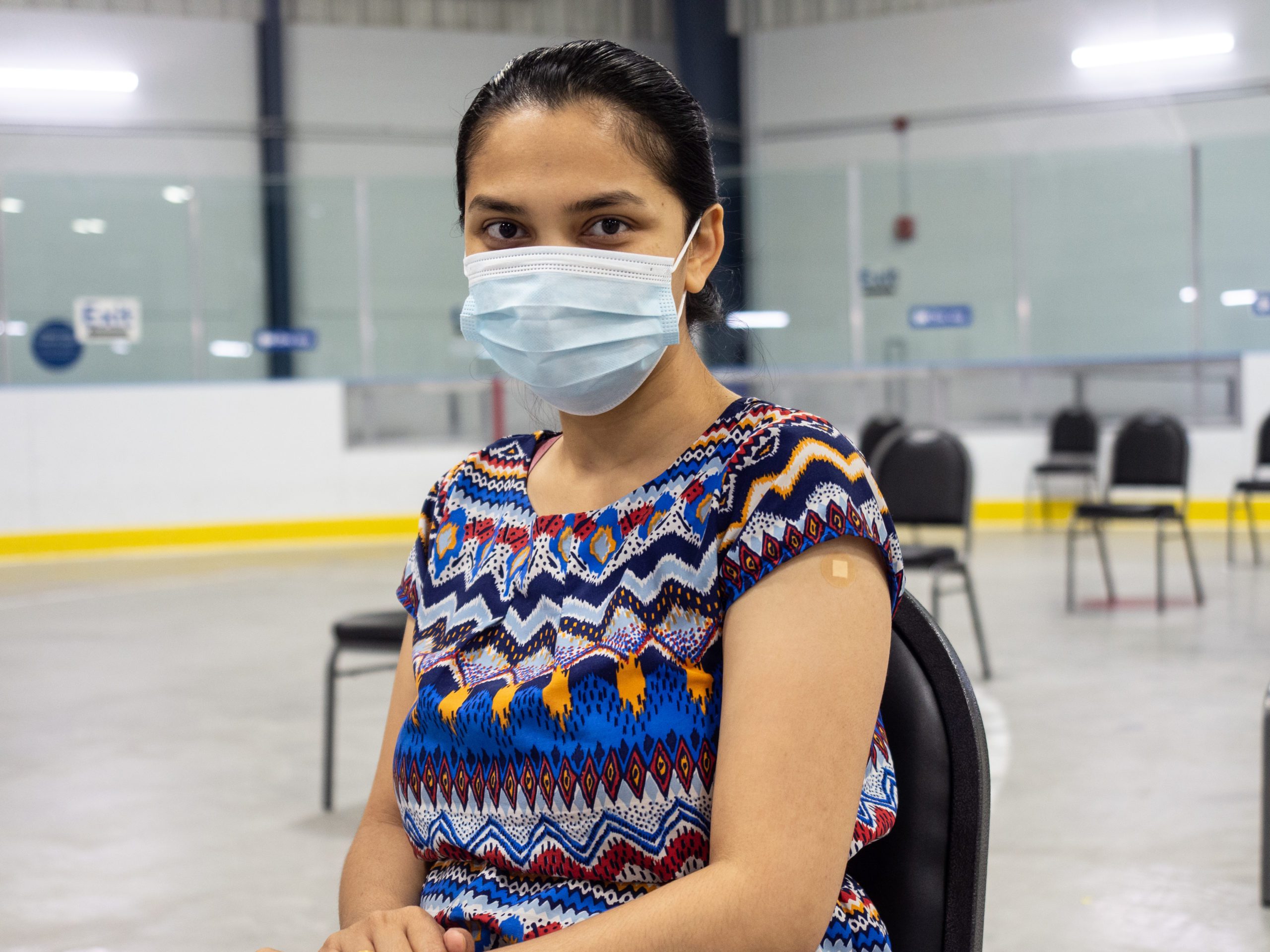
V. Shah waits under medical supervision in a rink after receiving her vaccine on May 4, 2021.
Sarah J. was initially “on the fence” about getting vaccinated because her husband opposes COVID-19 vaccination, but when community ambassadors from PCHS showed up at her door, she went for it. She had been expecting a huge line-up at the clinic, but was pleasantly surprised by how quickly she got vaccinated. “I even brought a chair,” she said.
For PCHS’s manager of operations, Manvir Bhangu, the “really human touch” that characterizes this outreach approach imbues the vaccination effort with a certain “beauty,” she said. “That’s what we’re taking away from this every day: to be able to play a small role in somebody’s journey of being vaccinated.

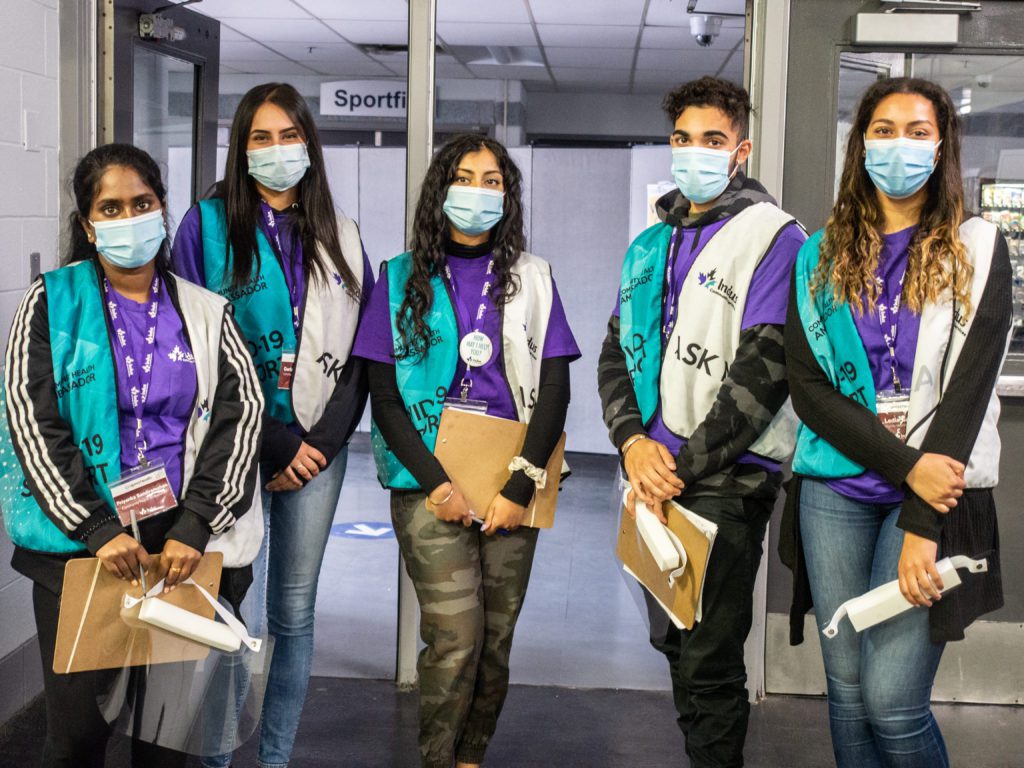
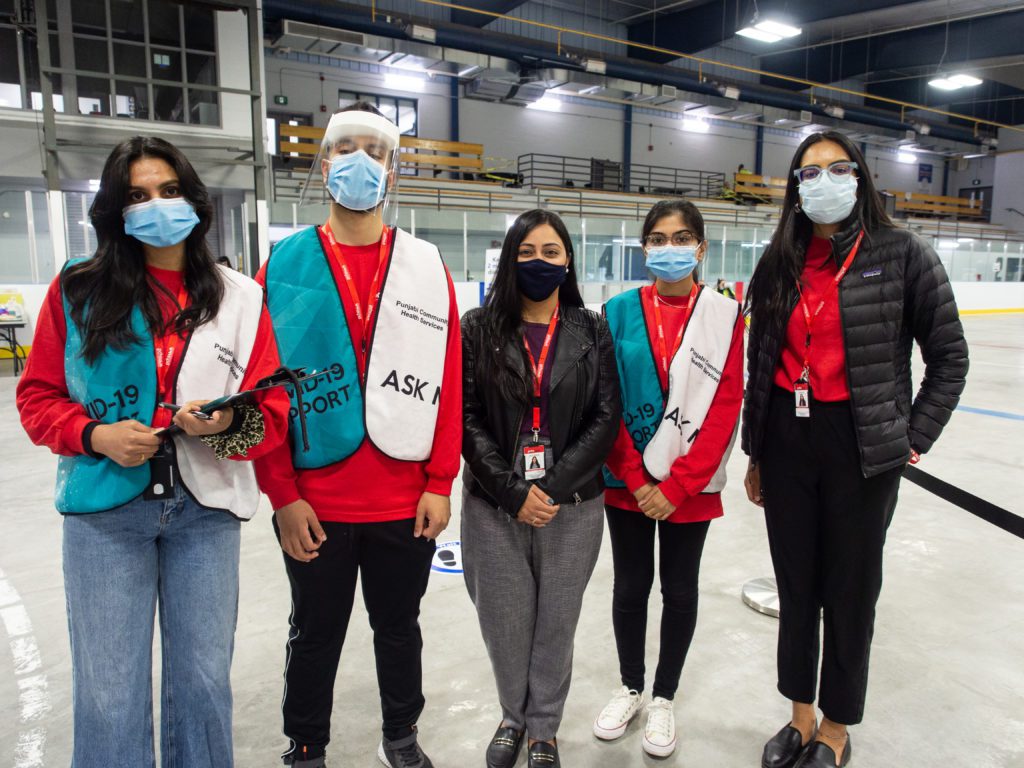
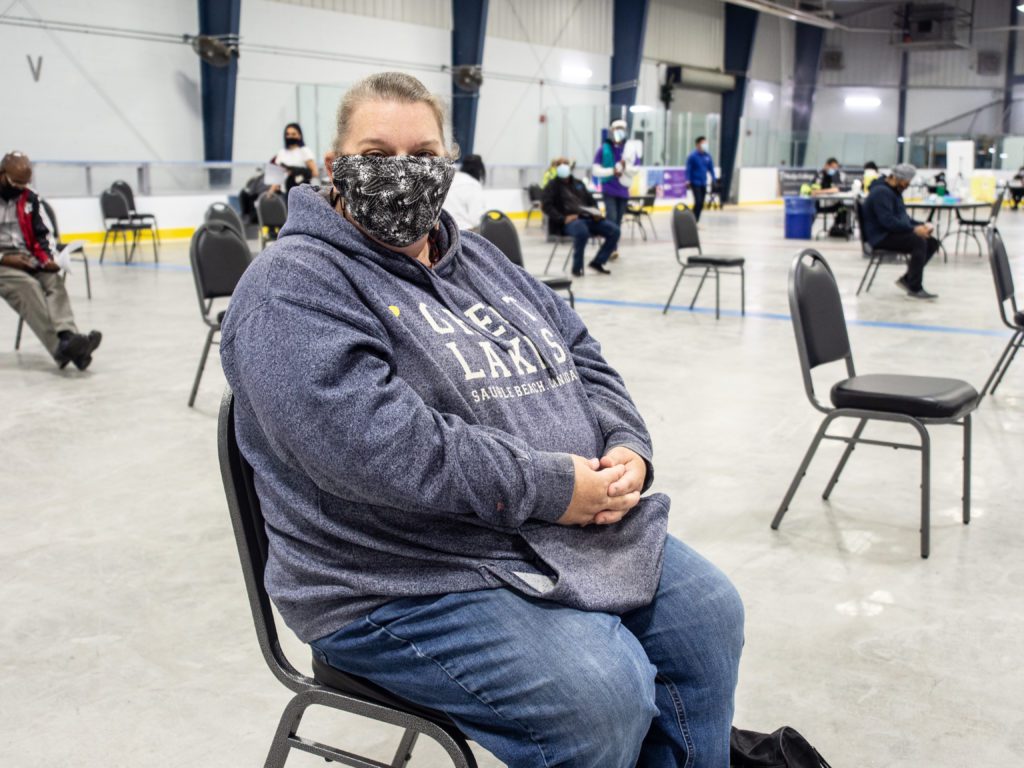

The comments section is closed.